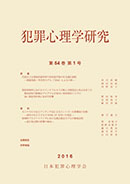
- Issue 2 Pages 1-
- Issue 1 Pages 1-
- |<
- <
- 1
- >
- >|
-
Hiromichi Kato, Tomoo Okubo2005 Volume 43 Issue 1 Pages 1-16
Published: 2005
Released on J-STAGE: August 07, 2018
JOURNAL FREE ACCESSThe purpose of this study is to examine a relationship between problem behaviors and student cultures. We conducted a questionnaire, which contained scales of (1) negative feelings about school life, (2) experiences of problem behavior, (3) the level of problem behavoir of school, (4) images of "bad student", for 674 junior high school students of 5 schools. All students and schools were divided into two categories, students who have problem behaviors and normal student; schools with high level of problem behavior and schools with low level. And we have examined what differences in student cultures between schools with high levels of problem behavior and schools with low levels are. A result of comparison between problem schools and non-problem schools, students of problem schools have more positive image about bad student and more negative feelings about school life than that of non-problem schools. And there are such differences not in problem students but normal students. We considered that the consiousness and attitudes of normal students are related to the high level of problem behavior of school. Thus, in order to prevent and solve the problem behavior among students, it is important that we give instructions and supports to only on problem students, but also normal students.
View full abstractDownload PDF (1518K)
-
Keiko Niregi2005 Volume 43 Issue 1 Pages 17-35
Published: 2005
Released on J-STAGE: August 07, 2018
JOURNAL FREE ACCESSAn investigation of junior high-school students with anti-social yearning was carried out to examine the association of attributional style with self-esteem and inconsistent frame-works of cognition (consisted of 4 items) as measured by An attribution scale based on Weiner's attribution theory and self-esteem scale for adolescents which were newly made by this researcher.
Analyses revealed that junior high-school students with anti-social yearning attributed significantly more to their own efforts and ability to make friends in case of acceptability of inter-personal relations than pro-social students, but in the rejected cases of it, they attributed to the associated others. They also exhibited a lower self-esteem than pro-social group by Rosenberg's self-esteem scale and the self-esteem scale for adolescents. In this scale, though being lower in self-confident factor and in self-acceptability, they showed to be higher in self-affirmativeness compared with pro-social students. Co-relational analyses revealed that anti-social yearning was related to the attribution to their own efforts on accepted occasions. There were also significant relationships between anti-social yearning with low feeling-loved by parents, low selfacceptability, and ambivalent frame-works of cognition.
Specific perceptions to predict the associations with anti-social yearning in male students were the attribution to their own efforts in case of acceptance, the low feeling-loved by their parents and inconsistent frame-works of cognition. In female students, only the low feeling-loved which represented supportiveness of the emotional warmth in their family relationships, predicted the associations with anti-social yearning.
View full abstractDownload PDF (16494K) -
Kyoko Hazama2005 Volume 43 Issue 1 Pages 37-49
Published: 2005
Released on J-STAGE: August 07, 2018
JOURNAL RESTRICTED ACCESSDownload PDF (1341K)
-
Keita Ochi2005 Volume 43 Issue 1 Pages 51-60
Published: 2005
Released on J-STAGE: August 07, 2018
JOURNAL FREE ACCESSDownload PDF (4974K)
- |<
- <
- 1
- >
- >|